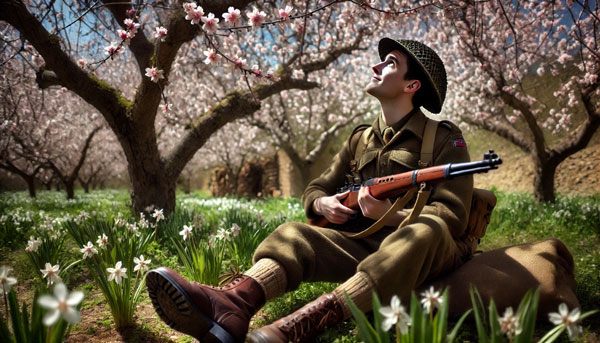To-day we have naming of parts. Yesterday,
We had daily cleaning. And to-morrow morning,
We shall have what to do after firing. But to-day,
To-day we have naming of parts. Japonica
Glistens like coral in all of the neighboring gardens,
And to-day we have naming of parts.
This is the lower sling swivel. And this
Is the upper sling swivel, whose use you will see,
When you are given your slings. And this is the piling swivel,
Which in your case you have not got. The branches
Hold in the gardens their silent, eloquent gestures,
Which in our case we have not got.
This is the safety-catch, which is always released
With an easy flick of the thumb. And please do not let me
See anyone using his finger. You can do it quite easy
If you have any strength in your thumb. The blossoms
Are fragile and motionless, never letting anyone see
Any of them using their finger.
And this you can see is the bolt. The purpose of this
Is to open the breech, as you see. We can slide it
Rapidly backwards and forwards: we call this
Easing the spring. And rapidly backwards and forwards
The early bees are assaulting and fumbling the flowers:
They call it easing the Spring.
They call it easing the Spring: it is perfectly easy
If you have any strength in your thumb: like the bolt,
And the breech, and the cocking-piece, and the point of balance,
Which in our case we have not got; and the almond-blossom
Silent in all of
the gardens and the
bees going backwards
and forwards,
For to-day we have naming of parts
.
Have you ever been "part" of a captive audience where an authority figure has been authorized to speak, and you must listen silently, without fidgeting, where it is imperative that you do not respond vocally or visually in any way? In Naming of Parts, first published in 1942, Henry Reed, who served as a British Intelligence officer in World War II, explores such a Captor / Captee relationship in what has become his most widely read and admired poem.
Reed's speaker (most
likely a sergeant) is
conducting a training
drill for a platoon
that would consist of
approximately 25 to 30
recruits. Yesterday he
drilled them on "daily
cleaning" of their
rifles. Tomorrow's
topic will be "what to
do after firing." His
role, his part on
this early spring
morning is to explain
the nature and proper
use for each part of
the rifle which his
recruits may be called
upon to use in battle.
Attention or
non-attention to their
training officer's
drill could mean the
difference between life
or death for these soon
to be deployed
soldiers. But although
their sergeant assumes
that all members of his
captive audience are
listening, as Feste
notes in Twelfth Night,
"Thought is free." Some
may temporarily be
distracted by
observations that have
nothing to do with war.
Even split-second
inattention can lead to
disaster in combat
situations.
Reed need not take us
into the minds of all
his listeners. It is
enough for our poet to
enter the consciousness
of a single recruit who
silently speaks for the
uneasiness that most of
the others are feeling
as they anticipate a
threatening future. The
sergeant's
voice—loud,
insistent,
controlling—is
wholly focused on
drilling into memories
the proper use of each
part of the Lee-Enfield
No. 4 Mk I rifle
that AI tells me was
standard issue for the
British Army during
World War II.
As our recruit listens, he sees beautiful flowers and trees in the gardens beyond and around the training ground. As his leader reminds him where he was yesterday and where he will be tomorrow (but not next month) he is momentarily distracted by Japonica that
Glistens like coral in all of the neighboring gardens.
That supple
gleaming must provide
him with a lovely
contrast to the sharp
glint on the metal
barrel of his rifle on
this sunny Spring day.

His momentary inattention is less a thought than a visually inspired feeling, after which
he repeats his leader's words:
And to-day we have naming of parts.
His reiteration suggests that he is beginning to feel the gulf between the mechanical,
regimented environment he finds himself in and the beautiful, alternative spirit of a
world close by, but out of reach. (Notice that he is not encountering wild nature, but
lovingly tended gardens that emphasize the different nature and outcomes of human
activity in war and peace.)
The sergeant's list of rifle parts in stanza two, with upper and lower and piling sling
swivels, is notable for its thumping, consonantal noise. As if longing for an alternative to
those harsh sounds, our recruit notices that the branches of the trees are quiet as they
Hold in the gardens their silent, eloquent gestures.
He is struck by the contrast
between mechanical military sounds and motions— marches, salutes, and training
drills—versus the lively, lilting swaying motion of flowers in the breeze,
Which in our case we have not got.
As in stanza one, the recruit's last line repeats his leader's last line. Our recruit, however,
is not mourning the loss of a "piling swivel" but the structural beauty of the peaceful
gardens, supported by the eloquent gestures of almond tree branches.
Stanza three reminds us that tomorrow we will have "What to do after firing" as our
driller emphasizes the necessity for the recruits to release the safety-catch on their rifles
with
an easy flick of the thumb
. He is adamant that he does not want to
See anyone
using his finger
. AI explains that using one's finger can take extra time, may weaken
rifle grip, and if the trigger finger is used, lead to accidental discharge.

Delighted by the blossoms in the garden, our recruit feels the gulf that separates the two
worlds he is experiencing more keenly:
The blossoms / Are fragile and motionless,
never letting anyone see / Any of them using their finger.
Biologically incapable
of violence, flowers have no need of a finger or thumb to wage war on neighboring flower
beds.
In stanza four the sergeant explains how to load or unload rifles; how to ready them for
firing or disarm them for safety by sliding the bolt
Rapidly backwards and forwards
,
an action he calls Easing the spring
. As he hears these words our recruit is watching
The early bees
going
rapidly backwards and forwards
, assaulting and
fumbling the flowers.
Assault can be a military word; bees do invade gardens and their buzzing noise might
make them sound like an attacking enemy. But far from "easing the spring" on a weapon
to destroy flowers, they are, as the recruit's capitalization implies, easing the Spring,
helping the flowers reproduce while providing honey for their own community. (Two
species cooperating with each other so both can survive.)
All commentators seem to believe that Reed's final stanza is structurally the same as his
first four, wherein the first three and a half lines present the sergeant's speech and the
final two and a half the thoughts of the recruit. I believe that all the words in the final
stanza belong to the recruit:
They call it easing the Spring: it is perfectly easy
If you have any strength in your thumb: like the bolt,
And the breech, and the cocking-piece, and the point of balance,
Which in our case we have not got; and the almond-blossom
Silent in all of the gardens and the bees going backwards and forwards,
For to-day we have naming of parts
.
The first four stanzas always include a clear syntactical break between the sergeant's
words and the observations of our thinker. The sergeant's segments always end with a
firm period; the recruit's thoughts with a new sentence. But there isn't any syntactical
transition in stanza five. Instead, we get a complex, uninterrupted single sentence which
can only belong to our recruit. It wouldn't make sense for the sergeant to repeat his
earlier verbiage; nor could he possibly close by quoting thoughts from the recruit's mind
which are antithetical to his training mission.
Moreover, the repetition between the final line of stanza four and the first line of stanza
five (They call it easing the Spring
) implies continuation of the recruit's thoughts
rather than a transition to the drill sergeant who has only used the word "spring" once,
where it is decapitalized to refer to a part of a rifle. The recruit capitalizes Spring in the
final line of stanza four and the first line of stanza five because the "early" bees are not
opening a rifle breech but the season that regenerates life. And why would one so fiercely
dedicated to the military naming of parts, refer to Spring, instead of his weapon?
The identical wording between stanzas lets us know that the recruit is repeating himself,
then recapping his sergeant's language with disdainful irony. It almost feels as if he is
waking from silent thought to protest the captivated position in which he finds himself.
Although "point of balance" refers to a spot on a rifle essential for effective
maneuverability, it's important to realize that the sergeant has not used the term. The
recruit has added it to mourn the loss of the balance of power between nations that can
only be restored by violence.
Naming of Parts is a poem about human stewardship over the earth gone awry. Having
expressed his frustration, if only to himself, our recruit's attention shifts to the bees and
the almond blossoms once again. He slips back into his melancholy, elegiac mood with
his closing images (and the almond-blossom / Silent in all of the gardens and
the bees going backwards and forwards
)—accepting the fact that the peaceful
harmony and co-existence they symbolize are, alas,
what we have not got
.
In this deconstructed, broken world all we have is
Naming of Parts.
Reed's title puts many things off-stage in this poem. The words war, battle, life, violence,
and death are never mentioned. Today is emphasized four times and tomorrow once, but
the threat of a not-so-distant future not at all. Where the recruits are and where they are
headed is left unsaid. They are a captive audience listening to a captive actor prepare
them to act in what their superiors have named a "Theater of War."
Because Naming of Parts is about discreation I'll close with verses from Genesis 2: 19-20
(KJV) where Adam is naming all the wondrous creatures on God's newly created planet.
Although he does not directly allude to it, Reed probably expected us to have this story in
the back of our minds while reading Naming of Parts:
And out of the ground the Lord God formed every beast of the field, and every
fowl of the air; and brought them unto Adam to see what he would call them:
and whatsoever Adam called every living creature, that was the name thereof.
And Adam gave names to all cattle, and to the fowl of the air, and to every
beast of the field.
Our mythical first father did not begin his stewardship
over the earth by naming the parts of a deadly weapon.
Note:
All images in this article are by ChatGPT's Artist in Residence: AI.
|